Saints of the Day
 |
 |
 |
 |
 |
 |
 |
Bl. Charbel Mackhlouf - January 24
Comments of Dr. Plinio:
Since we wait for the biography of Bl. Charbel Mackhlouf, the Maronite hermit monk from Lebanon, I will start with an introduction regarding his homeland and its ambience.
There is a sort of symbiosis between the panorama and the man. In general, we can only explain the mentality of a people in view of the panorama in which this people was formed. This is not difficult to understand.
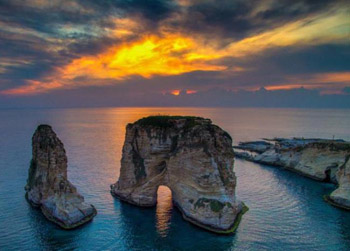
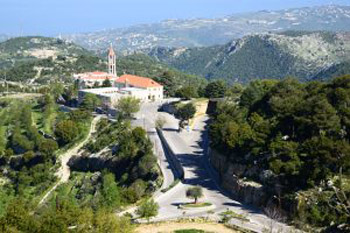
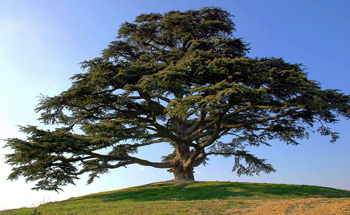 But, there is another side of the question that is more difficult to explain: that is, we can only fully understand entirely the panorama in view of the people who live there. Let us look, for example, at Greece. It is indisputable that the panorama of Greece offers a beauty of great value. But I have the impression that if the ancient Greek people had not lived there, we would not interpret entirely well those beauties. And, therefore, we would not discover the charms and artistic importance of that panorama.
But, there is another side of the question that is more difficult to explain: that is, we can only fully understand entirely the panorama in view of the people who live there. Let us look, for example, at Greece. It is indisputable that the panorama of Greece offers a beauty of great value. But I have the impression that if the ancient Greek people had not lived there, we would not interpret entirely well those beauties. And, therefore, we would not discover the charms and artistic importance of that panorama.
The same could be said of the panoramas of France or Venice.
For us to understand well the figure of Charbel Mackhlouf, we must situate him in the panorama of his people. He was a Maronite Catholic, an Arab by origin and race. He lived in Lebanon, in those regions so often described in Sacred Scriptures and so rich in poetry.
High mountains that descend into the Mediterranean and leave only a sliver of land between the mountains and the sea – mountains that hide something secret which reminds us of Our Lord Jesus Christ, perhaps because of their proximity to the Holy Land, certainly by their innate majesty and poetry.
Our Lady, for example, is compared various times to the mountains of Lebanon. I believe that it is those mountains of Lebanon which inspired the homage paid to her in the Little Office as the mountain set above other mountains – Mons super montes positum.
Lebanon also has a marvelous vegetation: Perhaps its most famous natural element is the cedar of Lebanon, one of the most robust trees that exist and very beautiful in shape. Scriptures refers to it as a symbol of beauty and poetry.
You should imagine in the context of that panorama an Arab. Here in this auditorium there are many descendents of Arabs. Now then, there are three types of Arabs: the contemplative, the warrior and the practical man.
The contemplative isolates himself and goes to the top of a mountain to look at the stars, where the tip of a cedar of Lebanon seems to touch a star. A breeze comes and he compares it with a spirit; he has a vivid imagination, a strong thirst for the marvelous; he is recollected and solitary.
Then there is the warrior Arab, represented by many personages who have become famous in History. Finally, the practical Arab is active and an entrepreneur, the type you know preponderantly in Brazil.
These are the three types of Arabs.
Bl. Charbel the contemplative monk
Bl. Charbel Mackhlouf is a contemplative Arab. A meditative Arab who carries in the depth of his gaze the mysteries of the Eastern nights, the mysteries of his contemplations and the mystery of his own soul.
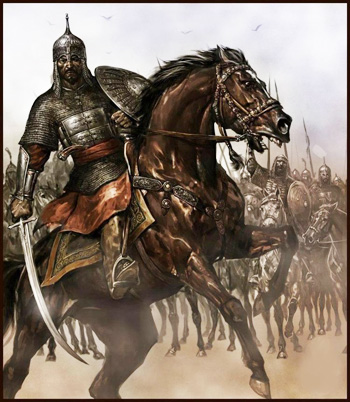 His physiognomy reveals a man who lived as a cenobite – which is a hermit who lives with other hermits in a monastery. He lived in a most complete silence, a most continuous contemplation and a most entire obedience, seeking one thing exclusively: to realize himself interiorly in the contemplation of God Our Lord. He made this mission to know and love God his greatest personal realization.
His physiognomy reveals a man who lived as a cenobite – which is a hermit who lives with other hermits in a monastery. He lived in a most complete silence, a most continuous contemplation and a most entire obedience, seeking one thing exclusively: to realize himself interiorly in the contemplation of God Our Lord. He made this mission to know and love God his greatest personal realization.
To be entirely as God wished him to be was the absolute objective of Bl. Charbel's will, which he pursued obstinately, continuously, meditatively, supernaturally – no matter the cost. This is the explanation of the soul of Bl. Charbel Mackhlouf.
You should picture a man who is continuously thinking of God, who looks at the things of nature to refer them to God, who looks at the things of this world to understand to what degree they bring him closer to God or remove him from God.
He acquired that degree of interior contemplation that left him with a sovereign disdain for everything of the world. It is not a hatred for things of the world, but a distance set between him and them that leaves him untouched by them, unimpressed by them, not governed by them. They are there, he is far distant from them.
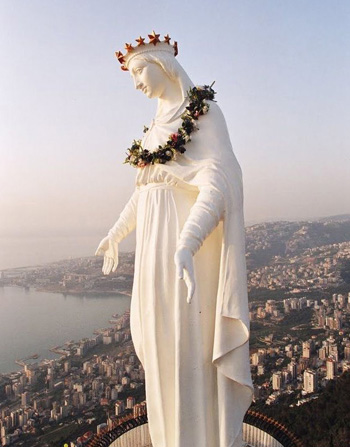 To reach this point he passed through the profound valleys of scorn. In his religious community he passed through the most humiliating types of despisal. For example, he practiced a rigorous obedience as the Rule commands. At times there are normal everyday things that one would know how to do, but according to the Rule he could not do them without permission. So, he would go to the Superior and ask permission.
To reach this point he passed through the profound valleys of scorn. In his religious community he passed through the most humiliating types of despisal. For example, he practiced a rigorous obedience as the Rule commands. At times there are normal everyday things that one would know how to do, but according to the Rule he could not do them without permission. So, he would go to the Superior and ask permission.
The somewhat liberal Superior would treat him scornfully with replies such as this: "I will not give you an answer because it is impossible for you to be so stupid as to ask permission for something that you should just do." It is not possible to despise a person more!
Someone who is subordinate and has to ask permission for the least thing he does in order to obey the Rule does something very difficult for human pride and for human weakness. So, with all the dependence, vassalage and respect, he goes to the Superior to ask what the Rule tells him to ask and he receives a personal affront… This is what he suffered.
And what would be his reaction to this outrage? He would stand with his head bowed before the Superior without saying a word until the Superior would give the permission. Finally the Superior, irritated and disgusted, would give the requested permission.
Blessed Charbel would not make a single complaint, a single sigh. His bowed head signified: "May the will of God be done in me. The will of God for me is the will of the Superior; now that I have his permission, I will go and do it."
You can imagine in that monastery isolated from the world, in that closed ambience, what it meant for a monk to be ill-considered by all for his fidelity. Misunderstood by all and keeping the silence alone, appealing only to God Our Lord… You can understand what this represented for his human detachment from everything.
Since there is no biography forthcoming, I cite from memory another fact that is among the culminating facts of his life. One day he was praying until late into the night, going over the time when the monastery lights should be turned off. The Superior noticed that the lamp in one cell was lit and recognized that it was the cell of Charbel Mackhlouf.
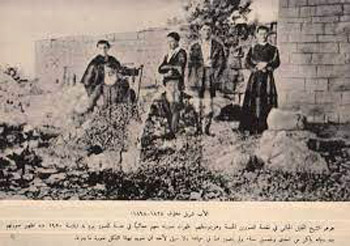 It so happens that liberals have this curious behavior: When they deal with bad persons they tolerate everything – broken rules, sins, scandals, to name just a few offenses – but if a virtuous man commits the smallest fault, they enter a paroxysm of "zeal" to comply with the law.
It so happens that liberals have this curious behavior: When they deal with bad persons they tolerate everything – broken rules, sins, scandals, to name just a few offenses – but if a virtuous man commits the smallest fault, they enter a paroxysm of "zeal" to comply with the law.
So the Superior went to his cell and knocked; Bl. Charbel opened the door and the Superior said: "Why do you have your lamp lit at this hour?"
He answered: "Father Superior, I could not fulfill all my obligations of prayer during the day because of this and that."
The Superior: "Do you not know that we must save oil?"
He answered: "Father Superior, I did not use oil, I put water in the lamp."
The Superior realized that the lamp was burning with water miraculously. He stopped complaining and simply said: "Pray for me," and went away…
This most extraordinary man was declared Blessed by the Church. One of his miracles was this: A a group of pilgrims went to his tomb to ask him for a grace or to thank him for one obtained. As is common on pilgrimages, they took a photograph of themselves there.
To the great surprise of all, when the photograph was developed the figure of Charbel Mackhlouf was there. If I am not mistaken, it was the photo that is projected here. I am not sure if the picture depicts him in his terrestrial life or in his celestial life.
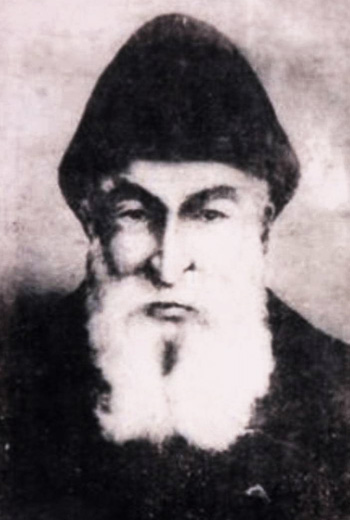 His physiognomy speaks to me more than any other face, except for the Holy Face in the Shroud of Turin and some representations of Our Lady.
His physiognomy speaks to me more than any other face, except for the Holy Face in the Shroud of Turin and some representations of Our Lady.
One is first impressed by the black of the hood and of his entire habit; and then, by the contrast between the black hood and the white beard. Next, by the extremely categorical note of the physiognomy: He is entirely categorical: What he thinks, he thinks; what he wants, he does. A man of an iron will!
You can notice the extraordinary regularity of his features: through the beard you can glimpse the oval shape of his face; the beautiful line of his eyebrows, the cheekbones that contribute to form a harmonious whole. Then, the proportion of the nose – the nose has something of an eagle's beak. In him there is a undefined aquiline note. It appears to me that there is in him something of the firmness of the eagle.
If you look at his eyes, they are gazing at an undefined point in the distance. These are the eyes of a thinker, a man of meditation who does not look at the trivial things around him, but gazes out at a point where all these things disappear and lose their importance before the grandeur of God, who is over and beyond them. A gaze turned toward infinity.
But, it is also a gaze turned toward himself. He is a man whose soul holds no mystery for him. He is in a state of continuous examination of conscience and knows perfectly what is happening within himself.
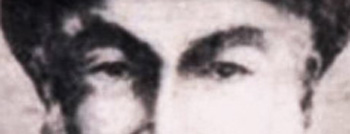 You also see an indifference toward everything that is not of God. You do not note any ambition, vanity, sentimentalism, or pity of himself. In him there is only the firm purpose to reach his ideal, which is God, in whom he trusts. Nothing more than this.
You also see an indifference toward everything that is not of God. You do not note any ambition, vanity, sentimentalism, or pity of himself. In him there is only the firm purpose to reach his ideal, which is God, in whom he trusts. Nothing more than this.
In him we see mountains of crystallized suffering. He suffered with such temperance that all the storms he bore made him firmer. He accepted the suffering completely and placed himself above it. Nothing can surprise him anymore. He fears only sin; his only hope is Heaven.
He is the natural patron of souls similar to him, but also of the souls that have defects opposed to his qualities: that is, dissipated souls turned toward trivial matters and earthly ambitions, proud souls, inconstant souls, agitated souls that have no peace. Above all, souls that are enemies of silence or of suffering should take him as a Patron.
I am sure that if a person like this would approach him, he would be treated with an affability and sweetness beyond imagination.


The Saint of the Day features highlights from the lives of saints based on comments made by the late Prof. Plinio Corrêa de Oliveira. Following the example of St. John Bosco who used to make similar talks for the boys of his College, each evening it was Prof. Plinio’s custom to make a short commentary on the lives of the next day’s saint in a meeting for youth in order to encourage them in the practice of virtue and love for the Catholic Church. TIA thought that its readers could profit from these valuable commentaries.
The texts of both the biographical data and the comments come from personal notes taken by Atila S. Guimarães from 1964 to 1995. Given the fact that the source is a personal notebook, it is possible that at times the biographic notes transcribed here will not rigorously follow the original text read by Prof. Plinio. The commentaries have also been adapted and translated for TIA’s site.
Since we wait for the biography of Bl. Charbel Mackhlouf, the Maronite hermit monk from Lebanon, I will start with an introduction regarding his homeland and its ambience.
There is a sort of symbiosis between the panorama and the man. In general, we can only explain the mentality of a people in view of the panorama in which this people was formed. This is not difficult to understand.

Lebanon, famous for its beautiful sunsets; below the Monastery of St. Maroun where Bl. Charbel stayed

Below, a cedar of Lebanon

The same could be said of the panoramas of France or Venice.
For us to understand well the figure of Charbel Mackhlouf, we must situate him in the panorama of his people. He was a Maronite Catholic, an Arab by origin and race. He lived in Lebanon, in those regions so often described in Sacred Scriptures and so rich in poetry.
High mountains that descend into the Mediterranean and leave only a sliver of land between the mountains and the sea – mountains that hide something secret which reminds us of Our Lord Jesus Christ, perhaps because of their proximity to the Holy Land, certainly by their innate majesty and poetry.
Our Lady, for example, is compared various times to the mountains of Lebanon. I believe that it is those mountains of Lebanon which inspired the homage paid to her in the Little Office as the mountain set above other mountains – Mons super montes positum.
Lebanon also has a marvelous vegetation: Perhaps its most famous natural element is the cedar of Lebanon, one of the most robust trees that exist and very beautiful in shape. Scriptures refers to it as a symbol of beauty and poetry.
You should imagine in the context of that panorama an Arab. Here in this auditorium there are many descendents of Arabs. Now then, there are three types of Arabs: the contemplative, the warrior and the practical man.
The contemplative isolates himself and goes to the top of a mountain to look at the stars, where the tip of a cedar of Lebanon seems to touch a star. A breeze comes and he compares it with a spirit; he has a vivid imagination, a strong thirst for the marvelous; he is recollected and solitary.
Then there is the warrior Arab, represented by many personages who have become famous in History. Finally, the practical Arab is active and an entrepreneur, the type you know preponderantly in Brazil.
These are the three types of Arabs.
Bl. Charbel the contemplative monk
Bl. Charbel Mackhlouf is a contemplative Arab. A meditative Arab who carries in the depth of his gaze the mysteries of the Eastern nights, the mysteries of his contemplations and the mystery of his own soul.

An Arab warrior
To be entirely as God wished him to be was the absolute objective of Bl. Charbel's will, which he pursued obstinately, continuously, meditatively, supernaturally – no matter the cost. This is the explanation of the soul of Bl. Charbel Mackhlouf.
You should picture a man who is continuously thinking of God, who looks at the things of nature to refer them to God, who looks at the things of this world to understand to what degree they bring him closer to God or remove him from God.
He acquired that degree of interior contemplation that left him with a sovereign disdain for everything of the world. It is not a hatred for things of the world, but a distance set between him and them that leaves him untouched by them, unimpressed by them, not governed by them. They are there, he is far distant from them.

Our Lady of Lebanon
The somewhat liberal Superior would treat him scornfully with replies such as this: "I will not give you an answer because it is impossible for you to be so stupid as to ask permission for something that you should just do." It is not possible to despise a person more!
Someone who is subordinate and has to ask permission for the least thing he does in order to obey the Rule does something very difficult for human pride and for human weakness. So, with all the dependence, vassalage and respect, he goes to the Superior to ask what the Rule tells him to ask and he receives a personal affront… This is what he suffered.
And what would be his reaction to this outrage? He would stand with his head bowed before the Superior without saying a word until the Superior would give the permission. Finally the Superior, irritated and disgusted, would give the requested permission.
Blessed Charbel would not make a single complaint, a single sigh. His bowed head signified: "May the will of God be done in me. The will of God for me is the will of the Superior; now that I have his permission, I will go and do it."
You can imagine in that monastery isolated from the world, in that closed ambience, what it meant for a monk to be ill-considered by all for his fidelity. Misunderstood by all and keeping the silence alone, appealing only to God Our Lord… You can understand what this represented for his human detachment from everything.
Since there is no biography forthcoming, I cite from memory another fact that is among the culminating facts of his life. One day he was praying until late into the night, going over the time when the monastery lights should be turned off. The Superior noticed that the lamp in one cell was lit and recognized that it was the cell of Charbel Mackhlouf.

Bl. Charbel appears in a photo of pilgrims at his tomb
So the Superior went to his cell and knocked; Bl. Charbel opened the door and the Superior said: "Why do you have your lamp lit at this hour?"
He answered: "Father Superior, I could not fulfill all my obligations of prayer during the day because of this and that."
The Superior: "Do you not know that we must save oil?"
He answered: "Father Superior, I did not use oil, I put water in the lamp."
The Superior realized that the lamp was burning with water miraculously. He stopped complaining and simply said: "Pray for me," and went away…
This most extraordinary man was declared Blessed by the Church. One of his miracles was this: A a group of pilgrims went to his tomb to ask him for a grace or to thank him for one obtained. As is common on pilgrimages, they took a photograph of themselves there.
To the great surprise of all, when the photograph was developed the figure of Charbel Mackhlouf was there. If I am not mistaken, it was the photo that is projected here. I am not sure if the picture depicts him in his terrestrial life or in his celestial life.

Blessed Charbel, a man with an iron will
One is first impressed by the black of the hood and of his entire habit; and then, by the contrast between the black hood and the white beard. Next, by the extremely categorical note of the physiognomy: He is entirely categorical: What he thinks, he thinks; what he wants, he does. A man of an iron will!
You can notice the extraordinary regularity of his features: through the beard you can glimpse the oval shape of his face; the beautiful line of his eyebrows, the cheekbones that contribute to form a harmonious whole. Then, the proportion of the nose – the nose has something of an eagle's beak. In him there is a undefined aquiline note. It appears to me that there is in him something of the firmness of the eagle.
If you look at his eyes, they are gazing at an undefined point in the distance. These are the eyes of a thinker, a man of meditation who does not look at the trivial things around him, but gazes out at a point where all these things disappear and lose their importance before the grandeur of God, who is over and beyond them. A gaze turned toward infinity.
But, it is also a gaze turned toward himself. He is a man whose soul holds no mystery for him. He is in a state of continuous examination of conscience and knows perfectly what is happening within himself.

In him we see mountains of crystallized suffering. He suffered with such temperance that all the storms he bore made him firmer. He accepted the suffering completely and placed himself above it. Nothing can surprise him anymore. He fears only sin; his only hope is Heaven.
He is the natural patron of souls similar to him, but also of the souls that have defects opposed to his qualities: that is, dissipated souls turned toward trivial matters and earthly ambitions, proud souls, inconstant souls, agitated souls that have no peace. Above all, souls that are enemies of silence or of suffering should take him as a Patron.
I am sure that if a person like this would approach him, he would be treated with an affability and sweetness beyond imagination.

 | |
|
|
The texts of both the biographical data and the comments come from personal notes taken by Atila S. Guimarães from 1964 to 1995. Given the fact that the source is a personal notebook, it is possible that at times the biographic notes transcribed here will not rigorously follow the original text read by Prof. Plinio. The commentaries have also been adapted and translated for TIA’s site.


